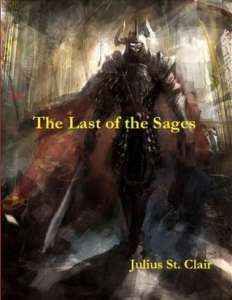★★★ 
When the world is threatened by the sinister forces of evil, heroes always rise from unexpected places. In The Last of the Sages, the first book of the epic Sage Saga by Julius St. Clair, readers are pulled into the mystical world of Allay, where magic and danger are everywhere, and where the life of young James is about to change forever.
After being told by his father that he is being sent to the Sentinel Academy – the mysterious training center that shapes young men of the kingdom into warriors – he decides to run away, but doesn’t get far. Not only does the Kingdom never seem to fight any wars, but no one ever returns from the Academy; funerals are often held the day after the young men depart. However, the powers of family and fate are strong, and James is inexorably dragged into this bizarre school and exposed to tests, mysteries, and the quest for a higher purpose that he had always lacked.
In a similar vein as Lev Grossman’s The Magicians, this book takes a wayward youth and tosses him into the fight of his life, where he meets new friends and discovers the powerful potential buried inside of him. Rather rapidly, James seems to evolve from a moody slacker into an eager student, and surprises his trainers with how adept he is. The book takes on the mood of a high school drama at times, and a mystical adventure at others, peppered in with the possibility of romance, intrigue, and betrayal among the ranks of the Academy.
There is a lot going for the novel, but the plot is a bit rambling and directionless, and the story itself seems slightly derivative of other authors and series. James and the other characters are well developed by St. Clair, but there aren’t many compelling moments that inspire loyalty or support for the protagonist. He isn’t overly likable at the start of the book, but seems to quickly shift his personality once he enters the academy, making his identity a bit too malleable to trust.
In terms of the progression of the narrative, it moves in fits and starts, with some of the passages serving no overwhelming purpose, as though the author was filling time before deciding where to take the story next. By the halfway mark of the book, the action becomes more important than many of the earlier scenes, and the novel ends strong, but there are many disjointed moments along the way. The target audience is a bit difficult to assess as well, as certain moments seem perfectly suited for YA readers, while other scenes are geared for adults or hardened sci-fi fans.
Additionally, there are myriad grammatical errors and misspellings, as well as repetitive language use of certain words. The mistakes are usually small, such as using “horde” instead of “hoard,” but there are enough of them to be distracting. A final polish would have been a simple way to clear up many of these errors.
The Last of the Sages doesn’t break great ground for a fantasy novel, but there are solid elements for the establishment of a series. Knowing that there are more books in this saga, it will be intriguing to see where these characters go next, but the quality of the writing and attention to detail should also grow and mature, just like the characters on the pages.
Links
Author Site
Amazon
Goodreads
STAR RATING
Design
Content
Editing
Get an Editorial Review | Get Amazon Sales & Reviews | Get Edited | Get Beta Readers | Enter the SPR Book Awards | Other Marketing Services























Leave A Comment